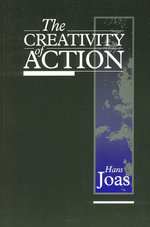
Joas argues for adding a third model of action to the two predominant models of rational and normative action—one that emphasizes the creative character of human action. This model encompasses the other two, allowing for a more comprehensive theory of action. Joas elaborates some implications of his model for theories of social movements and social change and for the status of action theory in sociology in the face of competition from theories advanced by Luhmann and Habermas.
The problem of action is of crucial importance in both sociology and philosophy, and this book—already widely debated in Germany—will add fresh impetus to the lively discussions current in the English-speaking world.

Niklas Luhmann is one of the greatest of contemporary social theorists, and his ultimate aim is to develop a conceptual vocabulary supple enough to capture what he sees as the unprecedented structural characteristics of society since the eighteenth century. Ours is a society in which individuals can determine their own sense of self and function rather than have that predetermined by the strict hierarchy of former times, and a key element in the modern sense of individuality is our concept of love, marriage, and lasting personal relationships. This book takes us back to when passionate love took place exclusively outside of marriage, and Luhmann shows by lively references to social customs and literature how a language and code of behavior were developed so that notions of love and intimacy could be made the essential components of married life. This intimacy and privacy made possible by a social arrangement in which home is where the heart is provides the basis for a society of individuals—the foundation for the structure of modern life. Love is now declared to be unfathomable and personal, yet we love and suffer—as Luhmann shows—according to cultural imperatives.
People working in a variety of fields should find this book of major interest. Social scientists will be intrigued by Luhmann’s original and provocative insights into the nature of modern marriage and sexuality, and by the presentation of his theories in concrete, historical detail. His work should also be capital for humanists, since Luhmann’s concern throughout is to develop a semantics for passionate love by means of extensive references to literary texts of the modern period. In showing our moral life in the process of revising itself, he thereby sheds much light on the development of drama and the novel in the seventeenth and eighteenth centuries.

Rare is the person who has never known the feelings of apathy, sorrow, and uselessness that characterize the affliction known as melancholy. In this book, one of Europe's leading intellectuals shows that melancholy is not only a psychological condition that affects individuals but also a social and cultural phenomenon that can be of considerable help in understanding the modern middle class. His larger topic is, in fact, modernity in general.
Lepenies focuses not on what melancholy is but on what it means when people claim to be melancholy. His aim is to examine the origin and spread of the phenomenon with relation to particular social milieux, and thus he looks at a variety of historical manifestations: the fictional utopian societies of the Renaissance, the ennui of the French aristocracy in the seventeenth century, the cult of inwardness and escapism among the middle class in eighteenth-century Germany. In each case he shows that the human condition is shaped by historical and societal forces--that apathy, boredom, utopian idealism, melancholy, inaction, and excessive reflection are the correlates of class-wide powerlessness and the failure of purposeful efforts.
Lepenies makes inventive use of an extraordinary range of sociological, philosophical, and literary sources, from Robert Burton's Anatomy of Melancholy to the ideas of contemporary theorists such as Robert K. Merton and Arnold Gehlen. His study gains added richness from its examination of writers whose works express the melancholy of entire social classes--writers such as La Rochefoucauld, Goethe, and Proust. In his masterly analysis of these diverse ideas and texts, he illuminates the plight of people who have been cast aside by historical change and shows us the ways in which they have coped with their distress. Historians, sociologists, psychologists, students of modern literature, indeed anyone interested in the problems of modernity will want to read this daring and original book.
READERS
Browse our collection.
PUBLISHERS
See BiblioVault's publisher services.
STUDENT SERVICES
Files for college accessibility offices.
UChicago Accessibility Resources
home | accessibility | search | about | contact us
BiblioVault ® 2001 - 2024
The University of Chicago Press









